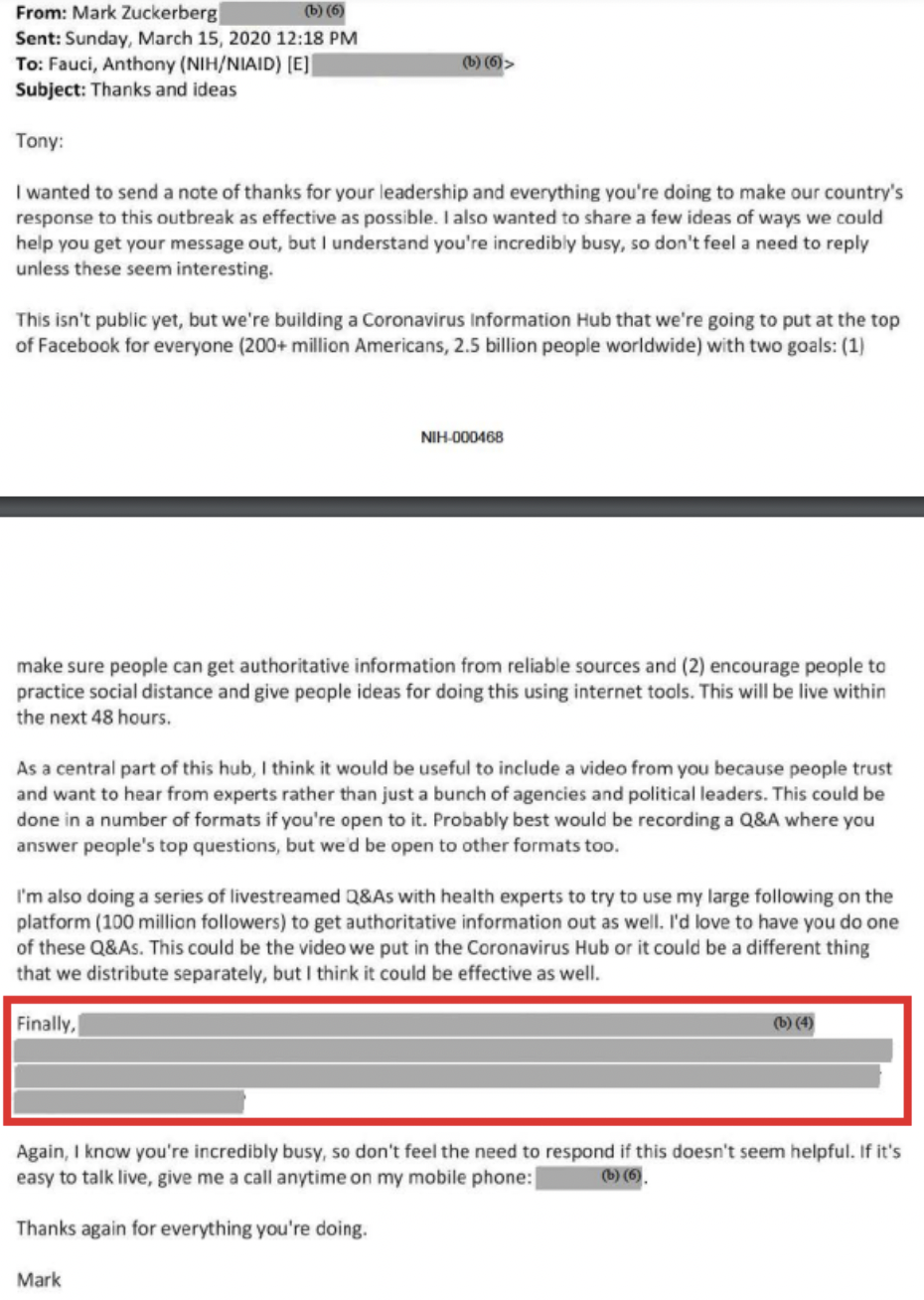Facebook CEO Mark Zuckerberg Offered Dr. Fauci ‘Very Exciting’ Proposal, Vaccine ‘Resources’
Emails show Mark Zuckerberg reaching out to the doctor to provide social-media messaging and financial assistance, including ‘authoritative information from reliable sources,’ and the ‘very exciting’ redacted offer.
Recently published emails revealed that Facebook CEO Mark Zuckerberg collaborated directly with Dr. Anthony Fauci, offering “resources” for COVID-19 vaccine development and a redacted offer Fauci described as “very exciting.”
The emails, released earlier this week, were obtained through the Freedom of Information Act (FOIA) by media organizations.
In one message from February 2020, Zuckerberg wrote to Dr. Fauci, director of the National Institute of Allergy and Infectious Diseases (NIAID) and then to the top White House COVID-19 adviser, offering help to facilitate development of coronavirus vaccines.
“I was glad to hear your statement that the covid-19 vaccine will be ready for human trials in six weeks. Are there any resources our foundation can help provide to potentially accelerate this or at least make sure it stays on track?” the Facebook CEO asked.
“If we start in April (~6-7 weeks from now) with a phase 1 trial of 45 subjects, it will take another 3-4 months to determine safety and some immunogenicity,” Fauci responded. “We may need help with resources for the phase 2 trial if we do not get our requested budget supplement. If this goes off track, I will contact you. Many thanks for the offer.”
On March 15, Zuckerberg again wrote to Fauci, this time with a proposal to highlight a video with Fauci on Facebook’s centralized COVID-19 “hub.” He noted another unknown offer as well that federal officials appear to have been even more interested in.
“I wanted to send a note of thanks for your leadership and everything you’re doing to make our country’s response to this outbreak as effective as possible. I also wanted to share a few ideas of ways we could help you get your message out,” Zuckerberg said.
“This isn’t public yet, but we’re building a Coronavirus Information Hub that we’re going to put at the top of Facebook for everyone (200+ million Americans, 2.5 billion people worldwide) with two goals: (1) make sure people can get authoritative information from reliable sources and (2) encourage people to practice social distance and give people ideas for doing this using internet tools,” he told Fauci. “As a central part of this hub, I think it would be useful to include a video from you,” Zuckerberg added.
“Your idea and proposal sound terrific. I would be happy to do a video for your hub. We need to reach as many people as possible and convince them to take mitigation strategies seriously or things will get much, much worse,” Fauci wrote back, despite having downplayed effectiveness of mitigation methods in other emails.
Zuckerberg also made another offer to Fauci, though it remains redacted as a FOIA b(4) exemption, that pertains to “trade secrets” or other confidential “commercial or financial information.”
Fauci called it “very exciting.” An NIAID official likewise described the redacted proposal as “an even bigger deal” than the video.
“The sooner we get that offer up the food-chain the better. I gave Bill Hall a heads-up about this opportunity and he is standing by to discuss this with HHS and WH comms, but I didn’t want him to do anything without being aware of the offer,” the official, Courtney Billet, told Fauci.
“Is it OK if I hand this aspect off to Bill to determine who the best point of contact would be so the Administration can take advantage of this offer, soonest?” she asked. Within days of Billet’s email, reports emerged that Facebook was working with the White House to provide the federal government with location data of social media users.
Facebook admittedly has been in close communication with the U.S. government throughout the COVID-19 crisis, consulting the Biden White House on alleged coronavirus misinformation, for example.
Besides offering resources for COVID-19 vaccines, Zuckerberg notably poured around $400 million of private money into election processes across the country last year ahead of the 2020 election. Many of the details of the unprecedented funding remain unclear, though experts who obtained documents from entities sponsored by Zuckerberg have estimated it gave Democrat-leaning counties massive spending advantages in battleground states.
Wisconsin lawmakers announced last week that they will be expanding an investigation into Zuckerberg’s funding after revelations that employees of a group backed by the tech founder may have violated election law and had access to ballots.


No comments:
Post a Comment
Leave your thoughts & comments